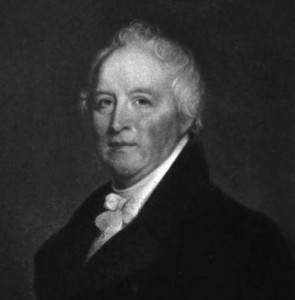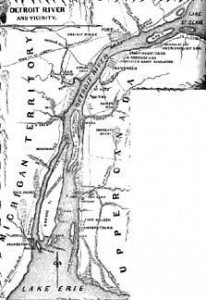
Hull was born in Connecticut on June 24, 1753. His father was Captain Joseph Hull III and his mother was Elizabeth Clarke Hull. Hull had eight siblings and two of his bothers, Joseph and Samuel Hull fought with him in the American Revolution [3]. As his father before him, William Hull studied law at Yale, although he never used his degree and shortly thereafter he ended up joining the militia at the beginning of the American Revolution [9].
Hull participated in the battles of Trenton, Saratoga, Stony Point and 5 others during the Revolutionary War. Having played a part in many battles, he was promoted from soldier to captain, major, and finally lieutenant colonel. Hull and his best friend from Yale, Nathan Hale, who would later become a well-know patriotic figure in his death. Hull had saved Hale’s life during the siege of Boston in 1776 and Hale was later sent on a spy mission behind the British lines in Long Island. Upon being captured and killed he uttered his famous words; “I only regret that I have but one life to lose for my country” [7].
Hull distinguished himself with his command of the rearguard at Fort Edward, and bravery in the battles of Bemis’s Heights, and Stillwater [1]. Taking note, President Thomas Jefferson made him governor of the Michigan Territory in 1789 [8]. With the post of governor came the post of Indian Agent because most all of Michigan was Indian lands. This post was thought good made for a military man due to being mostly unsettled except for military bases in Detroit and the Forts Michilimackinac on the mainland and Mackinac on the nearby island.
Although gaining territory for the settlers, Hull steadily decreased his standing with the Indians. On November 17, 1807, the Treaty of Detroit was signed by the Chippewa, Ottawa, Wyandot, and Potawatomi Indian tribes. The treaty gave the United States claim to the remainder of Ohio and the majority of the thumb of Michigan in exchange for renewed peace between the settler and Indians. Soon the settlers, having occupied all the treaty’s lands, continued to encroach on Indian land. When Hull refused to punish those who settled more land than allowed, tensions quickly rose. When 1812 arose and the British started forming defenses from the proposed invasion of Canada these Indians helped the British cause. [9]

Inhabitants of Canada! After thirty years of peace and prosperity, the United States have been driven to Arms, The injuries and aggressions, the insults and indignities of Great Britain have once more left them no alternative but manly resistance or unconditional submission- The army under my Command has invaded your Country and the standard of the United States waves on the territory of Canada to the peaceful unoffending inhabitant, It brings neither danger nor difficulty I come to find enemies not to make them, I come to protect not to injure you. –William Hull [1].
After British General Isaac Brock tightened up the Canadian militia, Hull was forced to retreat back to safety in Detroit. Having rushed into an attack, he artillery was not with Hull, instead they were delayed because of broken carriages. This lack of foresight lead to a low american moral that sunk even further during the retreat as they were unsure of the numbers of British and Indians they faced following them.
General Isaac Brock was a British General. Brock started by improving the militia, building better defenses and making friends with the Indian leader Tecumseh. Tecumseh would regularly raid Hull’s supply lines to hinder the fort and moral. On August 16, 1816, Fort Detroit fell to the British. Brock and Tecumseh mislead Hull to believe he was horribly out numbered. The British supplied extra Redcoats to the normal Canadian militia to make them look like more well trained soldiers. Tecumseh marched Indians over the same area three times the same direction, while hiding the return behind the hills, making his force look three times the size. Finally on August 15, with Hull’s confidence shaken, a demand of surrender was given to Hull:
Sir, The force at my disposal authorizes me to require of you the immediate surrender of fort Detroit. It is far from my intention to join in a war of extermination, but you must be aware, that the numerous body of Indians who have attached themselves to my troops, will be beyond control the moment the contest commences… -General Brock [1].
At this point in the battle only a few shells had made it in the fort and only one soldier was injured with no dead [1]. No one in the fort had thought that they were surrendering. Robert Lucas says “not one anticipated a Surrender till they saw the white flag displayed upon the walls” [2].
Soldier’s diaries portray Hull as not only incompetent but also traitorous. On August 15, Robert Lucas wrote about the buildup of British artillery uncontested on the other side of the valley.
What could have a greater appearance of treachery in our General, than suffering the enemy to erect their Battery unmolested, and the refusing to grant Capt. Snelling Artillery to prevent their landing their troops. The British might easily [have] been prevented from erecting their battery’s and if Capt. Snelling had been furnished with artillery when requested he would have drove the British Vessels down the river, or Shattered them to pieces, and would entirely have prevented the enemy from landing their troops. It appears as if Colo. MacArthur and Cass had been sent a way on purpose by General Hull So that he might have a fair opportunity of Surrendering the fort to the British. –Robert Lucas [2]
Furthermore Hull still doesn’t try to defend the land troops coming by boat, and in fact sends his ships to other places days before the attack efficiently overriding Snelling’s defenses. Lewis Cass, Hull’s successor, blamed Hull for the surrender as he took over Governor of the Michigan Territory. Hull was sent to military court for his actions and sentenced to be shot to death. The only general to be ordered shot. Hull later received a pardon from President James Madison shortly before the execution. Hull lived another 13 years until he died on his farm in 1825 in Newton, Massachusetts [5].
Primary Sources:
- Canada. Ottawa, Government Printing Bureau. Public Archives of Canada. Documents Relating to the Invasion of Canada and the Surrender of Detroit, 1812. By E. A. Cruikshank. Ottawa: Government Printing Bureau, 1913.
- Iowa. State Historical Society of Iowa. The Robert Lucas Journal of the War of 1812 during the Campaign under General William Hall. By Robert Lucas. Ed. John C. Parish. Iowa City: Lucas Robert, 1906.
- Dudley, Thomas P. “Chapter 28: Western Reserve and Northern Ohio.” Ann Arbor, Michigan: U of Michigan Library, 2005. Print.
Secondary Sources:
- “Detroit Historical Society: Frontiers to Factories: Curriculum.” Detroit Historical Society: Frontiers to Factories: Curriculum.
- Naveaux, Ralph. “Bio – William Hull.” Bio – William Hull.
- Rembrandt Peale., RembrandtPeale. General William Hull. 1907. Colonial Society of Massachusetts, 364
- “Patriot Nathan Hale Was Hanged.” Patriot Nathan Hale Was Hanged. n.d.
- Baker, Mark Allen. “Chapter 2: In Wake of a Revolution.” Connecticut Families of the Revolution: American Forebears from Burr to Wolcott. N31-32. Print.
- “William Hull.” Wikipedia.org.
- The Detroit Frontier in 1812
For Further Reading
- Joe Garner, “The Northwest Theater of the War of 1812, General Henry Proctor, and the Battle of Frenchtown” [MHUGL 2015]
